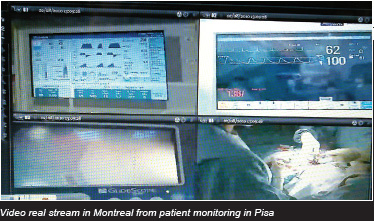
Video conferences may be known for putting people to sleep, but never like this. Dr. Thomas Hemmerling and his team from McGill University's Department of Anesthesia achieved a world's first on August 30, 2010, when they treated patients undergoing thyroid gland surgery in Italy remotely from Montreal. The approach is part of new technological advancements known as "teleanaesthesia" that involves a team of engineers, researchers and anaesthesiologists who will ultimately apply the drugs intravenously that are then controlled remotely through an automated system.
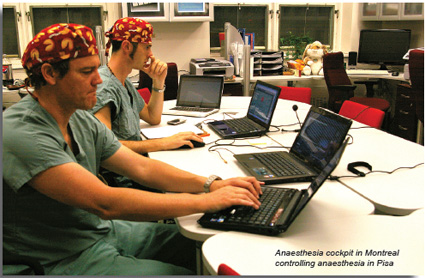
This achievement is a product of an ongoing scientific collaboration between Dr. Hemmerling's team and the Italian team of Dr. Zaouter from the Department of Anesthesia of Pisa University (Chairman Prof. Giunta).
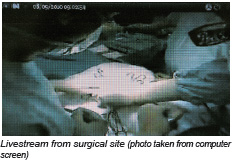
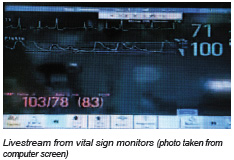
"The practice has obvious applications in countries with a significant number of people living in remote areas, like Canada, where specialists may not be available on site. It could also be used for teaching purposes, allowing the resident to perform tasks without the physical presence of a tutor, thus increasing his or her confidence level," said Dr. Hemmerling.
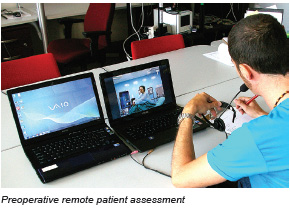
Four strategically placed video cameras monitored every aspect of patient care in Pisa, Italy, in real time. Ventilation parameters (such as the patient's breathing rate), vital signs (ECG, heart rate and oxygen saturation) and live images of the surgery are monitored by each camera, with the fourth was used for special purposes. A remote computer station ("anaesthesia cockpit") is required, as is a workstation that handles the audio-video link between the two centres. "Obviously, local anaesthesiologists can override the process at any time," Dr. Hemmerling explained. Prior to the operation, an assessment of the patient's airway and medical history is also performed via video conferencing. The researchers are also looking at the possibility of preoperative assessment of patients at home. It used to be that invasive blood tests or other tests were required in preparation for many surgeries, but that's no longer the case. Many patients take very long journeys and often wait hours to see an anaesthesiologist who will ask them specific questions, but video conferencing could eliminate these logistic problems and probably reduce the preoperative stress of the patients coming into the hospital before surgery. "The next steps will be to confirm the results of this pilot experience with further studies," Dr. Hemmerling said. Source: McGill University
Nike KD Video conferences may be known for putting people to sleep, but never like this. Dr. Thomas Hemmerling and his team from McGill University's Department of Anesthesia achieved a world's first on August 30, 2010, when they treated patients undergoing thyroid gland surgery in Italy remotely from Montreal. The approach is part of new technological advancements known as "teleanaesthesia" that involves a team of engineers, researchers and anaesthesiologists who will ultimately apply the drugs intravenously that are then controlled remotely through an automated system.
Video conferences may be known for putting people to sleep, but never like this. Dr. Thomas Hemmerling and his team from McGill University's Department of Anesthesia achieved a world's first on August 30, 2010, when they treated patients undergoing thyroid gland surgery in Italy remotely from Montreal. The approach is part of new technological advancements known as "teleanaesthesia" that involves a team of engineers, researchers and anaesthesiologists who will ultimately apply the drugs intravenously that are then controlled remotely through an automated system.  This achievement is a product of an ongoing scientific collaboration between Dr. Hemmerling's team and the Italian team of Dr. Zaouter from the Department of Anesthesia of Pisa University (Chairman Prof. Giunta).
This achievement is a product of an ongoing scientific collaboration between Dr. Hemmerling's team and the Italian team of Dr. Zaouter from the Department of Anesthesia of Pisa University (Chairman Prof. Giunta). 
 "The practice has obvious applications in countries with a significant number of people living in remote areas, like Canada, where specialists may not be available on site. It could also be used for teaching purposes, allowing the resident to perform tasks without the physical presence of a tutor, thus increasing his or her confidence level," said Dr. Hemmerling.
"The practice has obvious applications in countries with a significant number of people living in remote areas, like Canada, where specialists may not be available on site. It could also be used for teaching purposes, allowing the resident to perform tasks without the physical presence of a tutor, thus increasing his or her confidence level," said Dr. Hemmerling.  Four strategically placed video cameras monitored every aspect of patient care in Pisa, Italy, in real time. Ventilation parameters (such as the patient's breathing rate), vital signs (ECG, heart rate and oxygen saturation) and live images of the surgery are monitored by each camera, with the fourth was used for special purposes. A remote computer station ("anaesthesia cockpit") is required, as is a workstation that handles the audio-video link between the two centres. "Obviously, local anaesthesiologists can override the process at any time," Dr. Hemmerling explained. Prior to the operation, an assessment of the patient's airway and medical history is also performed via video conferencing. The researchers are also looking at the possibility of preoperative assessment of patients at home. It used to be that invasive blood tests or other tests were required in preparation for many surgeries, but that's no longer the case. Many patients take very long journeys and often wait hours to see an anaesthesiologist who will ask them specific questions, but video conferencing could eliminate these logistic problems and probably reduce the preoperative stress of the patients coming into the hospital before surgery. "The next steps will be to confirm the results of this pilot experience with further studies," Dr. Hemmerling said. Source: McGill UniversityNike KD
Four strategically placed video cameras monitored every aspect of patient care in Pisa, Italy, in real time. Ventilation parameters (such as the patient's breathing rate), vital signs (ECG, heart rate and oxygen saturation) and live images of the surgery are monitored by each camera, with the fourth was used for special purposes. A remote computer station ("anaesthesia cockpit") is required, as is a workstation that handles the audio-video link between the two centres. "Obviously, local anaesthesiologists can override the process at any time," Dr. Hemmerling explained. Prior to the operation, an assessment of the patient's airway and medical history is also performed via video conferencing. The researchers are also looking at the possibility of preoperative assessment of patients at home. It used to be that invasive blood tests or other tests were required in preparation for many surgeries, but that's no longer the case. Many patients take very long journeys and often wait hours to see an anaesthesiologist who will ask them specific questions, but video conferencing could eliminate these logistic problems and probably reduce the preoperative stress of the patients coming into the hospital before surgery. "The next steps will be to confirm the results of this pilot experience with further studies," Dr. Hemmerling said. Source: McGill UniversityNike KD
 iConnectHub
iConnectHub
 Login/Register
Login/Register Supplier Login
Supplier Login



























